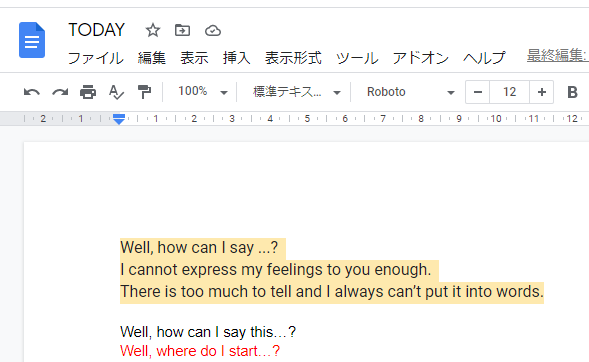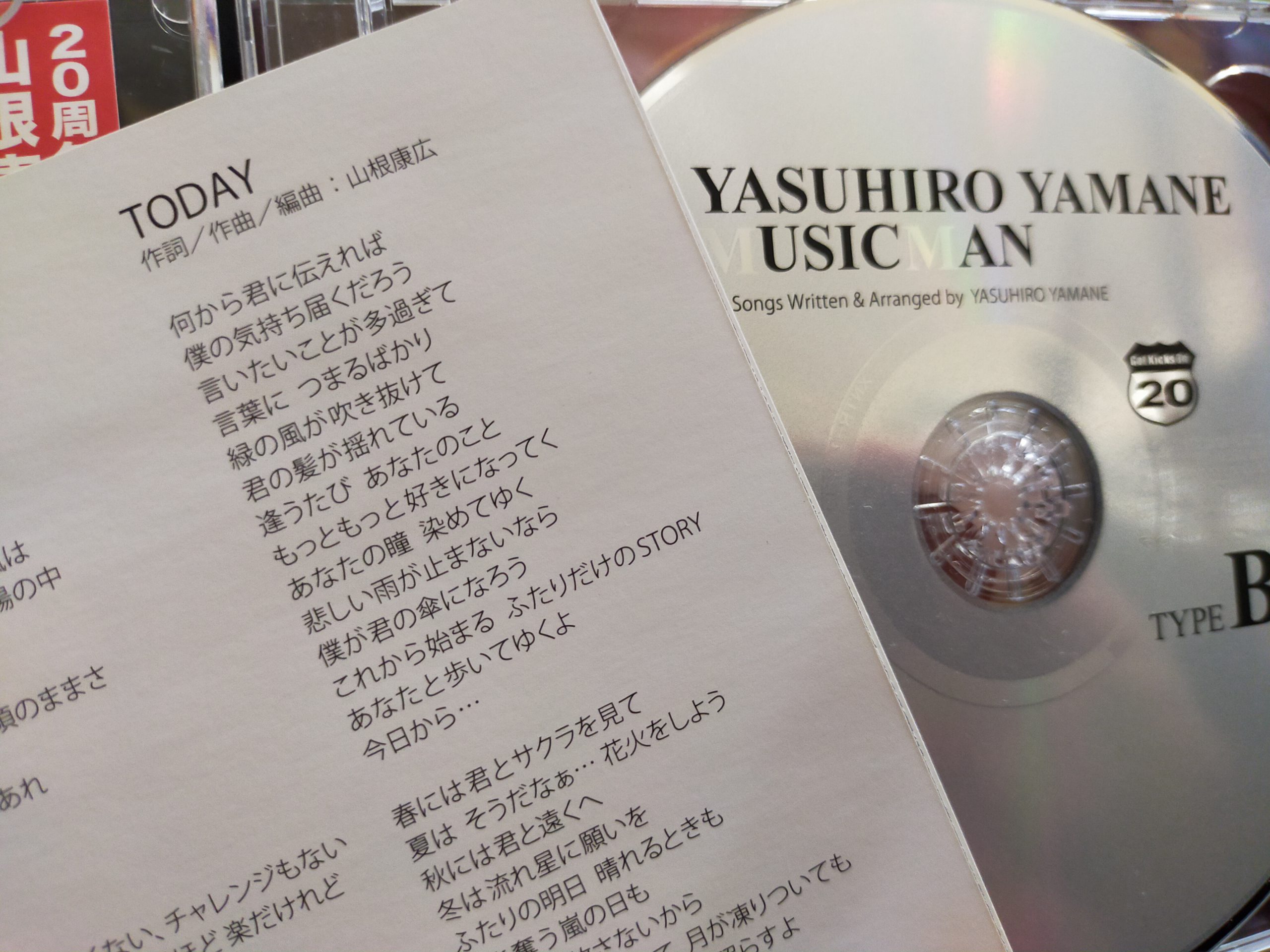Weekend translation
子供たちが小さくても、色々勉強したい。大好きな山根さんの楽曲の歌詞がお題目なら継続できるかな、という超私的な魂胆。
・深夜早朝に歌詞を自分なりに翻訳する。
・週末にレッスン受講し添削してもらう。
・曲の雰囲気や作られた背景も伝える。
・復習用にこのブログにまとめる
注:歌詞の背景、状況説明は私の勝手な個人的日本語解釈で進めています。バイリンガル講師がなかなか見つからず、講師が日本語が分からないためにどうしても説明が多分に必要だからです。
#15 TODAY
今回のお題は「TODAY」
とっても幸せな気持ちになれる、優しい曲です。
「太陽が燃え落ちて 月が凍りついても」だなんて!・: *:・: * (゚ロ゚* ぐはぁ
それでもあなたの明日を照らしたい、僕。
ロマンティックな曲ですね、またまたこの人、イギリス人のN先生にお願いします。

Well, “How can I say” better to say, you’ve got to say “how can I say this?” If he wants to say something in particular. Does he want to tell her something specific or does he just generally want to tell her?
もし彼が何か具体的なことを言いたいなら「How can I say」にはthisを足して。それとも具体的なことが決まっていないままだけど話をしたいということ?

Not specific.
特に明確にこの時点で「これを伝えたい」というものはないです。

Ok. Maybe you could say, well… “Where do I start?” He wants to talk to her, probably a lot of things, but he doesn’t know where to start.
そう。なら「どこから始めたらいい?」がいいかな。
あ、そうそう。それはよく聞くー!

…Ummm…
“I don’t know exactly how to express my feelings to you.” because “I cannot express my feelings to you enough.” It sounds a little bit the way…, he has already told her and it seems like she doesn’t understand.
Because for example in English we can say…”I cannot stress this point enough.” When we put enough at the end, It means that it is somehow “has been said, and is now being repeated.” in order to emphasize that point. But I don’t think that’s what this means, what he’s trying to say is that… he cannot adequately express his feelings. So… “No words are enough to express my feelings to you. “
うーん、
「どうしたら僕の気持ち届くだろう」のところは「don’t know exactly how to express」がいいね。あなたのこの文だと、彼は彼女に何か言ったのだけど、彼女が理解していない感じがするの。「どうしたら彼女は僕の言うことを分かるかな」みたいな。enoughが最後にあるとね。enoughを使うなら「No words are enough to express my feelings to you.」がいいね。
な、なるほど…!!(;゚Д゚)

Your sentence… “There is too much to tell and I always can’t put it into words.”…Maybe we could stay here. “There’s too much I want to say but cannot put into words.”
「言いたいことが多すぎて言葉に詰まる」は、「伝えたいことがたくさんありすぎる、でも言葉にできない」って言うかな。
そうっすね!それがいい!(´ω`)

Today they start to walk together.
この日から彼らは一緒に歩き始めました。

“Let us walk the rest of our lives together today.”…OK. “Today, let us walk the rest of our lives together.”
「あなたと歩いていくよ 今日から」は「今日から、あなたと一緒に歩いていくよ」にしよう。

“How come you put the “today” on the top of the sentence?”
「今日から」を最初に持ってきたのはどうしてですか?
日本語での歌詞は「あなたと歩いてゆくよ 今日から…」なので、私はtodayを文の最後に置きましたが、最初に置く方が良いよ、ということで理由を聞いてみました。

Right, ok because the previous sentence is a little bit awkward because you have the first part of the sentence talks about the rest of our lives that talks about the future, and then it sends it by saying today. So it is a little bit awkward and weird to have those two timelines so close together in the sentence without any punctuation.
うん、todayを文頭に持ってきた理由は、文がちょっとぎこちないの。これから歩いていこうって「未来」を言ってるでしょ。そして「今日から」と来る。句読点のない文章の中で、この二つのタイムラインがとても近くにあるのは、ちょっと気まずくて変な感じがするの。だから文頭にtodayを置いて、それから未来のことを話す方が良いな。
英語の時制のセンス全くなし!!!
句読点大事!!!(´;ω;`)
日本語とはえらい違うよ!

And I think also the way it is written in the first sentence at the top in the original sentence… “Let’s walk”, it almost sounds like he’s saying “Let’s experience the rest of our lives together at this moment today.” rather than…. actually shifting the focus the first sentence has the focus on the rest of their lives and walking whereas the second sentence is slightly divided. The two parts by saying, “Today, let us walk the rest of our lives together.” so the focus is slightly on “today” and what is happening right now. That’s why actually both are ok.
「today」が文末にあると、「残りの人生を一緒に経験しましょう、今日この瞬間に」と言っているように聞こえるの。残りの人生と歩くことに焦点が当てられているのに対し、「today」が文頭にあると、「今日」と今起きていることに少し焦点を当てているの。実際にはどちらでもいいよ。
「あなたと歩いていくよ」
「今日から…」
メロディがあると自然にフォーカスしてるのが「今日」だけど
センテンスにする場合は語順を変えることも大事!
辞書で見落としていた…。
“from today onは永久・反復を含意し、文頭に置かれることが多い”

Well…It’s terrific for me to focus on this word and bring it to the beginning of the sentence…because the title of this song is “TODAY”…
あの…この単語にフォーカスするのは私にとってとても良いです。実はこの曲のタイトルは「TODAY」なので…。

Oh my goodness! I didn’t notice when I saw the title of the document “TODAY” I thought it meant “TODAY’S EXERCISE” lol.
あら、そうなの?アハハ気づかなかったわ!このドキュメントのタイトルに「TODAY」とあるのは単に「今日の教材」って意味だと思ってた(笑)

毎回googleドキュメントに英訳を書いて、先生に共有して赤字で直してもらっています…先生!これ実は曲名です。
タイトルの訳も難しい…。「唇よ愛を叫べ」って直訳したら絶対ぎこちなくなるもんな…。

But like I said because the lyrics don’t usually follow the same rules with regards to grammar or sentence structure. That’s why it’s easier here to play around with this a little bit.
でもさっきも言ったように、歌詞は文法とか文型とかのルールが違うからね。だから、ちょっと原文を変えた方が伝わりやすいよね。

I see.
直訳だめですよねー。

Out in the cherry blossom gardens, early in the springtime,
Let off fireworks, in the summer sunset,
Set out on a journey somewhere far away in autumn sunrise,
Wish on a shooting star in winter midnight.
初春は桜を見に出かけ
夏の黄昏に花火を打ち上げ
秋の夜明けに遠い所へ旅立ち
冬の真夜中には流れ星に願いを
ふんふん、いいね。
ここもどうにも直訳できない部分です。
「意味の伝わる英文」にするために、曲の雰囲気に合わせて動詞と目的語を足してセンテンスを作らねばならない…改めて日本語は1単語の持つ意味の幅が大きい言語だと実感します…短い文でも美しい!
春夏秋冬で韻を踏むような感じにするなら時間帯も入れたほうがいいか…なんとも難しいな!ヘナチョコ(´;ω;`)
冬はミッドナイトにしよう…
夏はサンセットとか…?では…秋はサンライズ…
曲調は、「君と遠くへ…」の秋から冬にかけてとてもドラマティック!な感じになりますね( ´艸`)。素敵なコーラスもさり気なく入っていて曲に深みをもたらしている感じなんです。
曲がかかっていないときに自分で口ずさむと、改めて「このメロディライン美しいな〜」と思える曲です。「この手を離さないから」のところとか大好き。

“Out in the cherry blossoms garden, early in the springtime,”…
if there is more than one garden…
いくつかお花見の場所はあるよね?

You are absolutely right. He’s not talking about a specific garden.
あ、そうです、特定の場所ではないです。

If he is generally just talking about gardens of cherry blossoms…”Gardens”
じゃあガーデンは複数のSをつけよう。チェリーブロッサムはSは削除でいいです。
いいんすか( ゚д゚)

“springtime”…I think it’s like this. ” spring-time”
春の期間/springtime、ここはハイフンいれよう。

Actually, we cannot enjoy cherry blossoms the whole spring, we can see them in early spring, so I put “springtime”. Can I use just “spring” here?
えっと、我々…春の間ずっと桜を見れるわけではないんです。見れるのは短い春の期間なので「early in the springtime」としました。こういう場合でも単に「spring/春」でいいですか?

I will probably use a “spring” only because it will be a little bit more consistent with the rest of the paragraph, … for me more natural “in early spring” but you can do both, that’s ok.
次の文と繋がりがあるから「春」で良いと思うよ。「in early spring」が自然かな。でも、どっちでもいいよ。

in the summer sunset
in autumn sunrise
in winter midnight
↓
into the summer sunset
to an autumn sunrise
on a winter’s midnight
It’s a bit more lyrical operatic style.
「花火」「旅」「願い」に合わせて前置詞を変えたほうが、よりもうちょっと叙情的になるね。
前置詞難しいぞー!( ノД`)

He tells her that even if the light of the world disappears, he will always be there for her.
世界から光が無くなっても、彼は常に彼女のそばにいる、と言います。

“Even if the sun burns out and the moon freezes, I brighten your future.”…OK.
Add “will always”, “I will always brighten your future.” or “light-up”
「太陽が燃え落ちて月が凍り付いても 僕があなたの未来を照らすよ」…うんうんいいね。「will always」を足して。それと、「照らす」は「brighten」のほかに「light-up」も使えます。

What is the difference between “brighten” and “light-up”?
ニュアンスは「brighten」と「light-up」でどう変わりますか?

OK, nice question. There is a very small difference, “light up” is a bit stronger. It emphasizes more… let’s say… when we say “brighten” it means… maybe it is like, he will make it lighter. Just a degree of difference. But “to lighten up” means really shine her future because the previous few lines were so dramatic in the way they were describing…”Even if the sun burns out and the moon freezes… So I will light up!” It means that he will really shine a light on her life.
良い質問ね。あんまり大きな違いはないよ。「light-up」の方がちょっと強くて協調してる感じ。「brighten」を使うと、「きっと彼は明るくする」ね。ただの程度の差。「light-up」は確かに彼女の未来を光らせる感じ。一つ前のセンテンスが超ドラマティックじゃない?「太陽が燃え落ちて月が凍り付いても…だから僕が照らす!」って「light-up」は本当に照らしてくれる感がするわ。
先生、「so dramatic」を強調( ゚д゚)。やっぱりラブソングはこの人におまかせしよう…パンデミックが終わったらぜひご来日を。ライブチケット2枚買っとくから。

Whereas “brighten” is not as strong in the way it is expressing it. But they’re actually very similar. It is a very very minor thing. “brighten” is also actually suggests a little bit of a degree and maybe an increase, you know, like I said, “So it might be bright.” He would just make it more bright, but “to light-up” means “no matter what if it’s that even if it is the night, I will make it bright.” you know.
そこまで強くないのが「brighten」。でも、とっても似ているから、違いはほんの少しです。「彼はより明るくできる」。でも「light-up」は、「たとえ何があっても、たとえ夜の闇の中でも、明るくするよ。」って言う感じかな。
なるほどー。先生今日もありがとうございました(*‘∀‘)。
baby stepで成長していきます…。
どうでもいいけど英国人の「チュデイ」って発音大好きです。
youtubeはアメリカ発音だと「ユーテューブ」なのに
なんで日本では英国風に「ユーチューブ」で広まったんだろう?
お茶は「ティー」ってアメリカ風に言うくせにさ。
英国では「チー」と「ティー」の間くらいの発音かな。
アメリカ英語が席巻する日本で、時折出会う英国「T」破裂発音、癒されます(*´ω`)。
水はウァーラァでなくてウォタじゃけん。。
TODAY
Well, where do I start…?
I don’t know exactly how to express my feelings to you.
There’s too much I want to say but cannot put into words.
Soothing breeze.
Your hair is fluttering in the wind.
The more I see you, the more I like you.
I’ll be your barrier
from the storm,
when life gets too heavy.
The story of the two of us has just begun.
Today, let us walk the rest of our lives together.
Out in the cherry blossom gardens in early spring,
Let off fireworks, into the summer sunset,
Set out on a journey somewhere far away to an autumn sunrise,
Wish on a shooting star on a winter’s midnight.
We never walk alone.
Dark’n stormy days and sunny days,
I will never let go of your hand.
Even if the sun burns out and the moon freezes,
I will always light-up your future.
I’ll be your barrier
from the storm,
when life gets too heavy.
The story of the two of us has just begun.
Today, let us walk the rest of our lives together.
10枚目のアルバムは安定感のある「より包容力に満ちた雰囲気」ですね。お若い頃のアルバムは、若い男性が多分よく感じる「未練」「恋心」がたくさん散りばめられていましたが、やはりご年齢を重ねて発表された楽曲には、声の深みも踏まえて「大きな包容力」を感じます。
家族が増え、今は子供たちメインに愛情を注いでいます。私自身も歳を重ねて、他人に、より優しくなった…気もします。(自分にも甘くなった!これは包容力と言うよりはただのヘタレと言うのかもしれない!(;´Д`))
20代のY2、50代のY2、少しずつ深くなっていく声。比べて聴くのも興味深いな(^^
しかしお若い頃の写真を見ると…
うーん…カッコいいなあ…(*´Д`)とキリがない…



There are so many things he wants to tell her that he is always at a loss for words when he talks to her.
たくさん言いたいことがある彼ですが、彼女には言葉が詰まって言い切れていません。